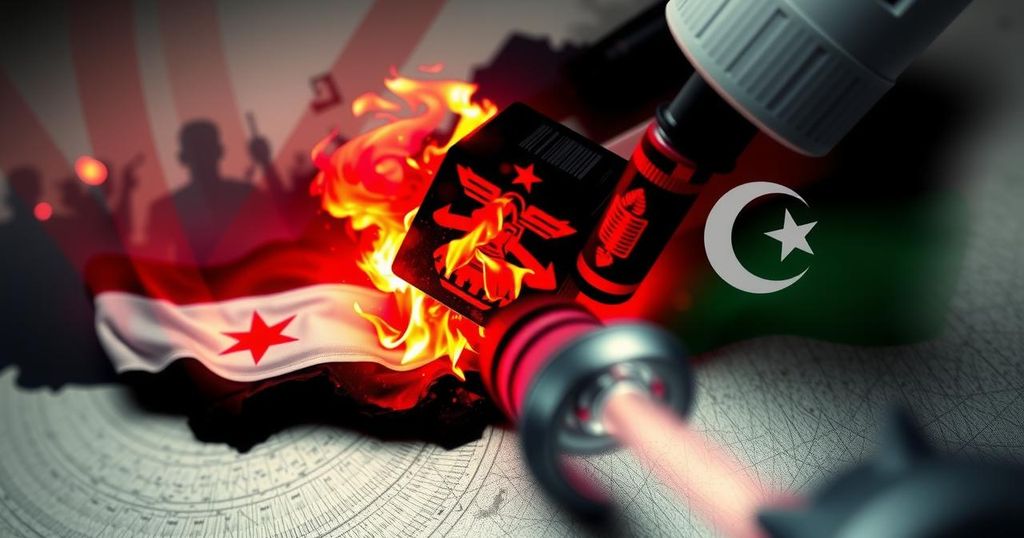Russia’s Strategic Shift: From Syria to a Fragile Libyan Power Play

Russia is shifting its strategic focus from Syria to Libya, capitalizing on the instability in Damascus to deepen its influence in the Libyan National Army led by Khalifa Haftar. This relationship underscores the fragility of Haftar’s power, heavily reliant on Russian support. The West must reconsider its approach to Libya, focusing on strengthening governance and resilience to counteract Russian influence effectively.
Russia is currently repositioning its strategic focus from Syria to Libya, following a significant shift marked by the recent changes in Damascus. Despite the Russian intervention that has long supported Bashar al-Assad, the Syrian leader has faced increasing internal dissent and external pressures. This transition reflects a broader strategic ambition by Moscow as it reallocates military resources to support the Libyan National Army (LNA) under Khalifa Haftar’s command. The Kremlin seeks to amplify its influence in Libya’s politically fractured landscape, utilizing the country’s chaotic dynamics to further affix its presence on the Mediterranean.
The current situation in Libya embodies the transactional nature of Russian foreign policy, which emphasizes continuity in its power projection rather than merely exchanging one proxy for another. While Haftar stands poised to benefit from Russian backing, his dependency makes him vulnerable—a circumstance illustrated by the past failures of Assad’s regime. The West, which previously overlooked Libya’s political evolution, now finds itself at a disadvantage as it attempts to disentangle Haftar from Moscow’s influence.
Moscow views Haftar as a strategic asset rather than a steadfast ally, leveraging his military reliance and logistical needs to reinforce its foothold in Libya. Despite external support from entities like the United States and the United Arab Emirates, Haftar’s trajectory is increasingly intertwined with Russia’s broader ambitions in the region. As Haftar presents the facade of power and stability, his relationship with Moscow remains precarious and indicative of the underlying vulnerabilities that he faces.
The burgeoning ties between the Haftars and Moscow are becoming more evident as they exploit Libya’s resources while circumventing sanctions against Russia. This dynamic has allowed Haftar to consolidate leadership within his family while amplifying his reliance on Russian military support. However, just as Assad’s regime ultimately faltered under similar pressures from Moscow, Haftar’s ambitions may succumb to the same fate without a stable indigenous governance structure.
Ultimately, the West must reconsider its approach to Libya and recognize that leveraging relationships with figures like Haftar may not yield the desired outcomes. The existing strategies only serve to obscure the deeper structural vulnerabilities within Libya that foreign powers can exploit. Moving forward, it will be crucial for the United States and its allies to redirect efforts towards fostering national stability, promoting governance improvements, and enhancing economic resilience to counteract Russia’s encroachment effectively.
The article discusses Russia’s strategic shift from its involvement in Syria to a greater focus on Libya, particularly through its support of the Libyan National Army under Khalifa Haftar. This transition follows a significant loss of influence in Syria, where the Assad regime has become increasingly fragile. The analysis highlights the transactional relationship between Russia and its proxies, and how external dependencies shape power dynamics within Libya, necessitating a reevaluation of Western strategies in the region. The text emphasizes that while Haftar may seem to project strength, his reliance on Russian support reveals a fundamental vulnerability that could mirror the decline of Assad’s position in Syria. Moreover, the article points to the strategic errors made by Western powers in underestimating Haftar’s entrenchment with Moscow and the complexities of Libya’s internal governance.
In conclusion, Russia’s pivot from Syria to Libya signifies a continuing effort to expand its influence in the Mediterranean region. The dependence of Khalifa Haftar on Moscow underscores the fragility of his position, mirroring historical precedents set by Assad. The West’s prior indifference towards Libya’s political landscape has left it at a disadvantage against Russian maneuvers. Moving forward, the focus must shift from reactive strategies to creating a framework that addresses Libya’s structural weaknesses while avoiding further entrenchment of foreign exploitation.
Original Source: www.atlanticcouncil.org







